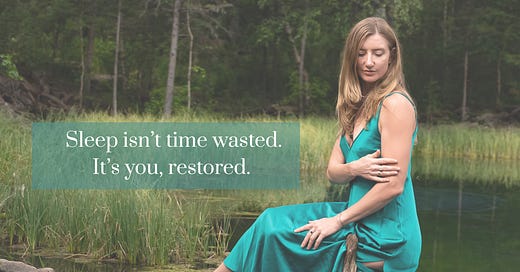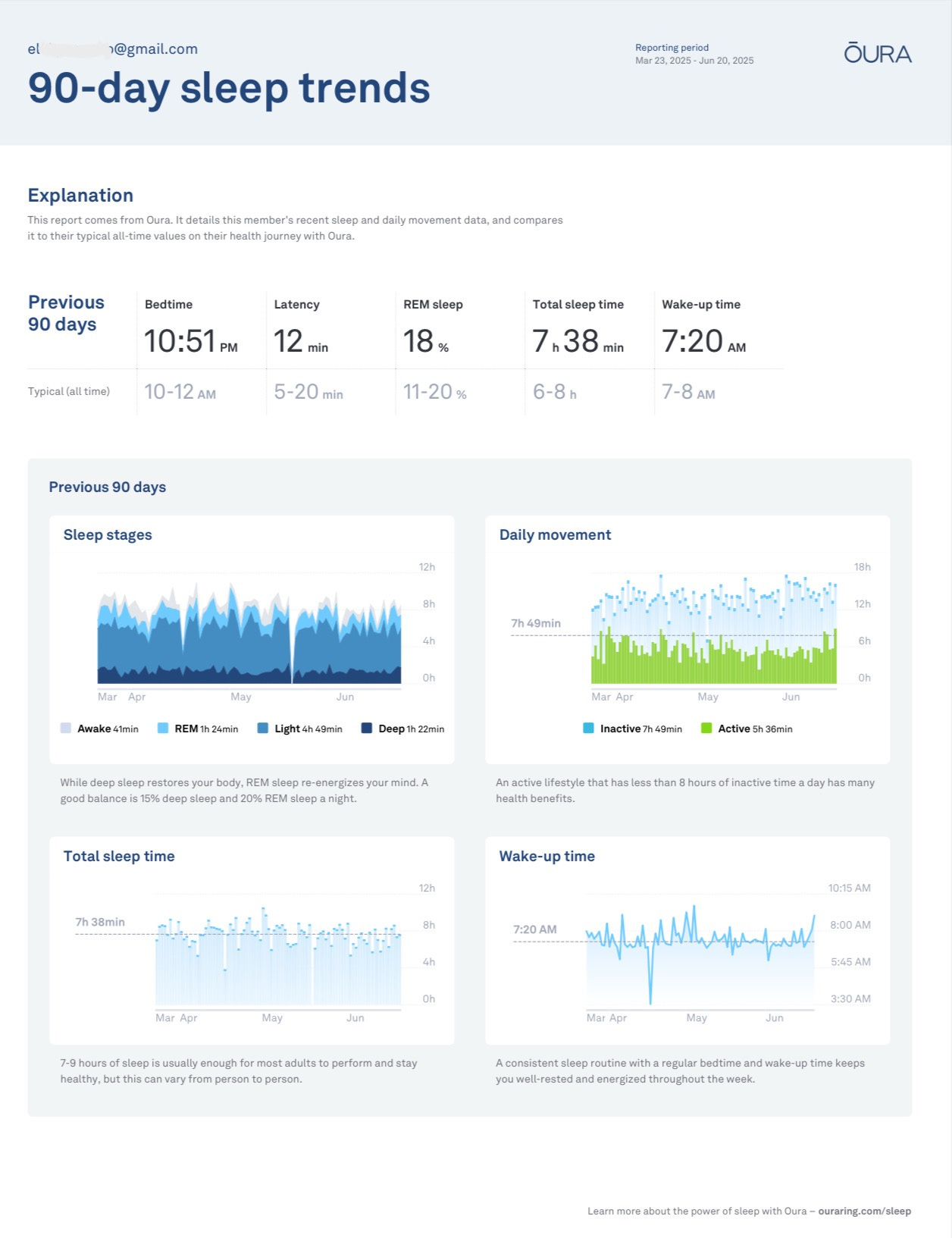You’re Not Tired—You’re Sleep-Deprived (and It’s Killing Your Potential)
Sleep isn’t self-care—it’s survival. The quality of your sleep shapes your thoughts, your energy, your leadership… even your future.
We talk a lot about performance. Clarity. Focus. Energy. Emotional intelligence. Presence.
But here’s the thing nobody tells you:
None of those things are possible without good sleep.
And I don’t mean “seven hours of tossing and turning” sleep.
I’m talking about deep, uninterrupted, high-quality sleep—the kind that clears your brain, regulates your hormones, repairs your body, and resets your entire nervous system.
You want to lead? Create? Thrive?
Then start by sleeping. Anything less is self-sabotage.
Sleep Deprivation Is Not a Badge—It’s a Brain Crash
Think skipping sleep makes you productive?
Let’s be clear: it doesn’t make you efficient.
It makes you impaired.
In Why We Sleep, neuroscientist Matthew Walker makes one thing painfully clear:
“The shorter your sleep, the shorter your life.”
Here’s what science tells us:
One night of 4–5 hours of sleep slows your reaction time more than being legally drunk.
Sleep deprivation suppresses your immune system and increases the risk of heart disease, diabetes, and Alzheimer’s.
Chronic sleep loss literally shrinks your brain—affecting memory, learning, decision-making, and emotional regulation.
You can’t make up for lost sleep on weekends. Sleep debt is cumulative.
Still bragging about your 5-hour hustle?
You’re not grinding.
You’re declining.
Want an Unfair Advantage? Sleep.
Sleep is your secret weapon.
When you sleep well:
Your brain clears toxins and locks in memories
Your hormones balance (hello good mood, metabolism, and recovery)
Your immune system strengthens
You think more clearly and react faster
You lead better - with more empathy and less reactivity
This isn’t woo-woo. It’s biology.
And it’s your edge—if you claim it.
You Don’t Need More Devices. You Need Better Habits.
A friend told me she calculated that fixing her sleep would cost her nearly $10,000 in gadgets and subscriptions - special thermoregulating mattresses, grounding sheets, red lights, vibrational music devices, blue-light blocking glasses, noise-canceling headbands…
All of it well-intended.
None of it foundational.
Because sleep isn’t something you buy.
It’s something you build - through rhythm, discipline, and deep respect for your biology.
The good news? It’s free.
The hard part? It requires change.
What Actually Improves Sleep (and Costs You Nothing)
Simple, science-backed habits that realign you with your natural rhythm:
Go to bed and wake up at the same time every day, even on weekends
No caffeine after 2PM
No screens 60–90 minutes before bed
No alcohol late at night—it sedates, but doesn’t restore
Keep your room dark, cool, quiet, and tech-free
Get morning sunlight to reset your internal clock
Use evening rituals—reading, journaling, herbal tea, breathwork—to wind down
These aren’t wellness trends—they’re biological non-negotiables.
The Only Tech I Recommend (For Awareness, Not Rescue)
I’m often asked about sleep trackers. My answer?
They won’t improve your sleep, but they will show you how your habits affect it.
If you’re curious about what’s happening while you sleep—how much deep vs REM sleep you get, your heart rate variability (HRV), your readiness and recovery—Oura Ring or WHOOP Band are the most accurate.
For many people, seeing their data is the wake-up call they need.
When the metrics confirm that a late-night workout or second glass of wine wrecks your sleep—it’s easier to change.
Use trackers to observe, not obsess.
What This Looks Like for Me
I’m still figuring this out, too.
I try to be in bed by 10:00, asleep by 10:30, and up by 7:00–7:30. That’s my sweet spot. On the days I honor that, I feel like the clearest, calmest, most creative version of myself.
However I’m not perfect. Here is my last 90-day trend report from the Oura app just to give you an idea:
I still struggle to put my phone away an hour before bed. Some days I work out late because that’s the only time I have. I get it.
But I’ve seen the difference. When I prioritize sleep—not just talk about it—I operate from a different place. I feel it in my energy, my focus, my emotional regulation. It’s noticeable.
And for me, that’s the motivation to keep going.
Tools That Actually Help (When Used Intentionally)
You don’t need a $10,000 setup to sleep well. But a few thoughtfully chosen tools can support your rhythm—especially if you travel often or need help winding down.
Here are some that work with your biology, not against it:
For Frequent Flyers + Time-Zone Shifts
Melatonin (0.3–1 mg): Low-dose, short-term use for resetting circadian rhythm. Take it 30–60 minutes before your new local bedtime.
Light exposure: Get direct sunlight in the morning in your new time zone to anchor your body clock.
TimeShifter App: Personalized travel jet lag plans based on your destination, flight, and sleep habits.
Supplements + Sleep Support
Magnesium Glycinate or Threonate: Supports nervous system relaxation. Take in the evening (200–400mg).
L-Theanine: Calms the mind without sedation.
5-HTP (100mg): Can help boost natural melatonin (check if you’re already on serotonin-related meds before using).
Ashwagandha or Rhodiola: Adaptogens that help regulate cortisol, especially useful for stress-driven insomnia.
Always consult a health professional before adding supplements.
Rituals + Wind-Down Tools
Magnesium body lotion or bath flakes. A double benefit—relaxation through skin absorption and ritual.
Pillow spray (lavender or chamomile). Signals the body it’s time to rest.
Red light lamp. Use at night to avoid disrupting melatonin production.
Weighted blanket. Helps calm an overstimulated nervous system
Let’s be clear:
No supplement or gadget can undo a chaotic sleep schedule.
Start with rhythm. Then use tools as allies, not crutches.
The most advanced sleep technology in the world is already inside you—it just needs you to listen.
Sleep Is the Hidden Engine of a Life Well Lived
In a world that glorifies productivity, sleep can feel like a luxury.
But it’s not.
It’s your most foundational act of self-respect.
If you care about how you live, how you love, how you lead—start here.
Because sleep isn’t time wasted - it’s you, restored.





